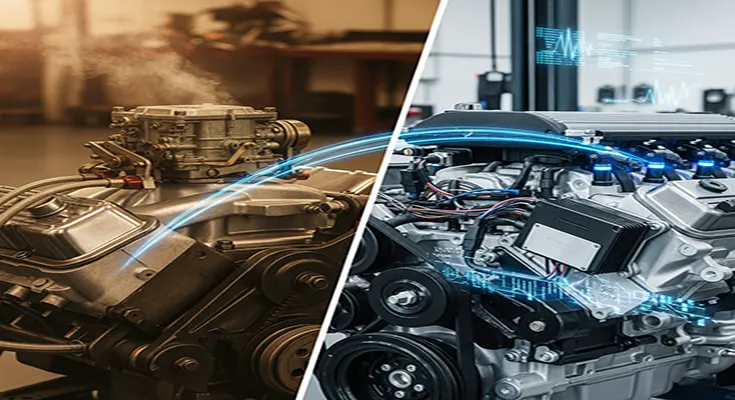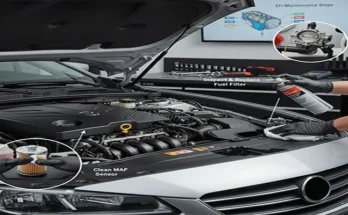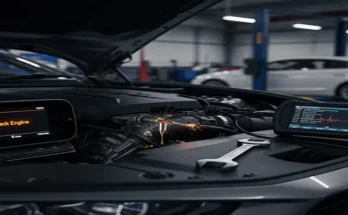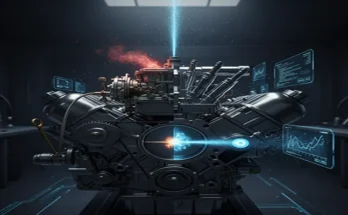For over a century, the simple, mechanical carburetor was the undisputed champion of mixing air and fuel for internal combustion engines. However, starting in the 1980s, a technological revolution—driven by rising fuel prices, stricter environmental laws, and the dawn of computer control—swept across the automotive industry. The result was the near-universal adoption of the Electronic Fuel Injection (EFI) system.
While carburetors retain a nostalgic appeal for their simplicity in classic cars, the EFI system is unequivocally superior in virtually every measurable metric for modern vehicles. This superiority is rooted in one key difference: precision.
Here are the major advantages of Electronic Fuel Injection systems over carburetors.
1. Unmatched Fuel Efficiency and Economy
The greatest single advantage of EFI is its ability to precisely manage fuel consumption, which a mechanical carburetor simply cannot match.
- Optimized Air/Fuel Ratio: The heart of the EFI system is the Electronic Control Unit (ECU)—the engine’s computer brain. The ECU constantly reads data from multiple sensors (oxygen, air temperature, throttle position, engine speed, etc.) to calculate the exact amount of fuel required for perfect combustion. Carburetors rely on air pressure differences (the Venturi effect) and fixed physical jets, often resulting in an unnecessarily “rich” (too much fuel) mixture.
- Reduced Fuel Waste: By maintaining the ideal stoichiometric ratio (roughly 14.7 parts air to 1 part gasoline), EFI systems eliminate the wasteful over-fueling common in carbureted engines, leading to significant savings at the pump. EFI can reportedly reduce fuel consumption by 15% to 30% compared to a carburetor on the same engine.
2. Superior Performance and Drivability
The real-time, instantaneous control of EFI translates directly into a better driving experience.
- Consistent Power Delivery: The EFI system ensures every cylinder receives an equally balanced and perfectly atomized fuel charge. This leads to smoother engine running, more consistent power delivery across the entire RPM range, and typically higher overall horsepower and torque than a carbureted version of the same engine.
- Sharper Throttle Response: Fuel is delivered instantly via a pressurized electric pump and solenoid-controlled injectors. This eliminates the “throttle lag” often experienced with a carburetor when the driver quickly opens the throttle.
- Seamless Altitude Compensation: Carburetors are highly sensitive to changes in altitude, requiring a manual re-jetting or tuning to run correctly in the thinner air of higher elevations. The EFI’s ECU automatically monitors barometric pressure and adjusts the air/fuel ratio instantly, ensuring peak performance whether at sea level or in the mountains.
3. Lower Emissions and Environmental Compliance
The precision of EFI was a necessity mandated by global environmental standards.
- Cleaner Combustion: By controlling the fuel delivery with microsecond accuracy, the ECU ensures that fuel is burned as completely as possible. This minimizes the creation of harmful byproducts.
- Emissions Compliance: The ability to precisely meter fuel allows modern vehicles to operate the catalytic converter at peak efficiency and meet increasingly strict government regulations for tailpipe emissions, something traditional carburetors cannot reliably do.
4. Increased Reliability and Reduced Maintenance
EFI systems largely eliminate the common headaches associated with mechanical fuel delivery.
- Improved Starting: The ECU calculates the optimal air/fuel mix for both cold and hot starts, eliminating the need for a manual “choke” and preventing the common carburetor issues of flooding or hard starting in extreme temperatures. When you turn the key, an EFI engine starts.
- No Periodic Tuning: Unlike carburetors, which “go out of tune” over time due to wear or environmental changes, EFI systems are self-adjusting and maintain their optimal state automatically. This drastically reduces the need for frequent manual maintenance and adjustments.
- Fewer Component Issues: EFI is far less susceptible to problems like carburetor icing (caused by cooling from air and fuel expansion) and vapor lock (fuel boiling in the line), which can cause random engine stalls in carbureted systems.
In conclusion, while the carburetor is a testament to simple mechanical ingenuity, the Electronic Fuel Injection system represents a powerful marriage of mechanics and computing. By replacing suction-based guesswork with sensor-driven precision, EFI delivers superior performance, lower emissions, higher fuel efficiency, and a level of all-weather reliability that cemented its place as the modern standard for vehicle fuel management.





